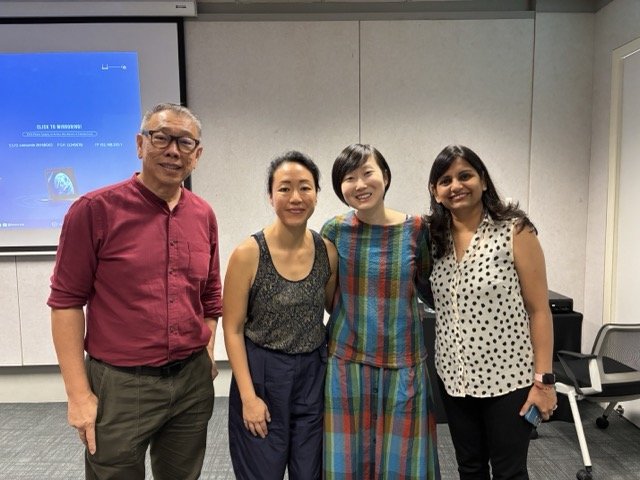Talk on Existential Therapy and Values Workshop (Humanist Society)
On 8 March, at the invitation of the Humanist Society, I gave a talk on existential therapy at Common Ground Civic Centre in Bedok. This talk was part of a series of conversations the Humanist Society has been organising on irreligiosity (that is, not having a religion) and mental health. I was really excited to have the opportunity to share more about existential therapy and the importance of finding meaning in life and living by one’s values.
What is humanism and how does it relate to mental health?
Humanism is an approach that rejects supernatural explanations for phenomena. Instead, it centres human beings and their power to effect change by their own actions. Humanists tend to value rationality, scientific enquiry, democracy, ethical behaviour, and human rights.
However, a 2021 study by Vaingankar et al., titled Religious Affiliation in Relation to Positive Mental Health and Mental Disorders in a Multi-Ethnic Asian Population, found that compared to participants who did not have a religion, having a religion was associated with better mental health, especially in terms of general coping, emotional support, and interpersonal skills.
This study led to commentary and articles in local media, such as Religion linked to better mental health, says study done in Singapore (Doo, 2021).
So, are humanists “doomed” to have poor mental health?
A brief introduction to existential therapy
In his book Existential Therapy (1980), Yalom wrote about the four “givens” of existence (also referred to “ultimate concerns”). These are things that all human beings must confront over their lifetimes. These four “givens” are:
Death. All living beings must some day die; death is an inescapable condition of being alive. Yet many people fear death and refuse to talk about or acknowledge it, while others are preoccupied with death to the point that it affects daily living. What can help us make peace with death and reconcile ourselves to its inevitability?
Freedom and responsibility. We tend to view “freedom” as something positive, yet the experience of freedom can also be terrifying, as it means that we are responsible for all of our actions.
Isolation. We can experience isolation within ourselves (for example, not knowing who you are) as well as isolation from other people. By nature, human beings crave community and belonging, yet we also have to face the fact that ultimately, each of us is alone.
Meaning and meaninglessness. We all have to contend with the question, why are we alive? What is the purpose of our existence? Religion provides one answer to this question, but without religion, what can provide the moral structure of our universe?
Presentation slide on the four “givens” of existence — death, freedom, isolation, and meaninglessness — as described by Yalom (1980), with the question: “Is religion the ‘best’ or only answer to these questions?”
What gives our lives meaning?
If we accept that life has no inherent meaning, and we reject supernatural explanations for the questions of existence, where does that leave us?
I suggest that this means we have to create meaning for ourselves.
Logotherapy and Man’s Search for Meaning (Frankl, 1946)
Victor Frankl was a Jewish psychiatrist who survived Auschwitz and other concentration camps. In 1946, he published his most famous book, Man’s Search for Meaning.
Frankl observed that the people who survived the camps were not those who were physically strong or fit, but the ones who had meaning and purpose. He concluded that having a reason to live, despite suffering, gave them the strength to survive.
Based on his observations, he developed logotherapy (from logos, meaning “reason”). In the words of Nietzsche, Frankl argued that “he who has a why to live for can bear almost any how.”
That is, if we can find meaning in suffering, we can accept it, transform it, and grow through our experiences.
The Values Workshop
After the information sharing session, it was time for activities!
“Live Your Values" deck of cards by Lisa Congdon and Andreea Niculescu
I used this set of values cards to facilitate discussions about the participants’ values and how they express these values in their lives.
Participants received one card each, then mingled with other participants to trade cards and hear each other’s stories about their values. Some participants could not relate to the original card they received and couldn’t wait to trade it away. Others felt that their card represented them exactly, and refused to trade for anything else!
Some interesting interactions:
One participant received the “excellence” value card, but decided to trade it for “moderation” — he had experienced hustling in a cutthroat corporate environment and now realised he wanted to ‘stop and smell the roses’
One participant chose two cards that seem contradictory: “social connection” and “solitude”! Yet she has been able to strike a balance between these two opposites, allowing her to acknowledge both parts of herself.
Two cards with the values of "social connection" and "solitude"
Clarifying your values
Participants were asked to reflect on:
What values did you feel an affinity towards?
What values did you reject? Is there a story there?
How did it feel to clarify your values?
How do you express your values in your life?
What have you learned about yourself?
Finally, I shared why I’m a counsellor.
Being a counsellor allows me to expresses my values of
Caring
Being a person of integrity, and
Helping others
Thank you very much to all who attended!
I hope you enjoyed the experience of clarifying and reconnecting with your values. Your generous and enthusiastic contributions to the discussion helped make the event a success. I hope to see you at future events.
Want to experience one of my workshops yourself?
Please get in touch if your organisation would like to host one of my talks or workshops!
For reference:







